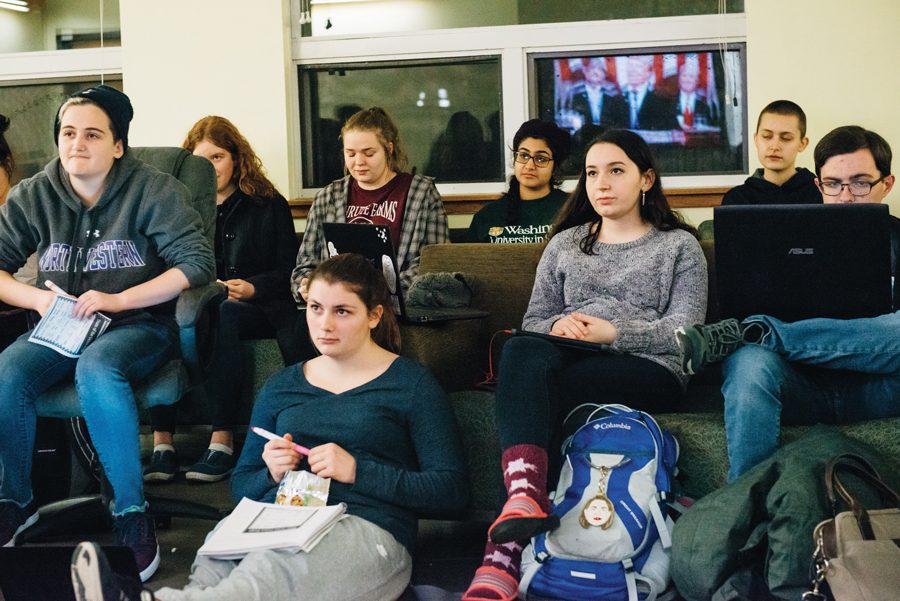Students, faculty react to Trump’s first State of the Union address
Noah Frick-Alofs/Daily Senior Staffer
Students watch the State of the Union address in Communications Residential College. Trump focused on immigration and foreign policy, but some students said they wished he would have mentioned more social issues.
January 31, 2018
In his first State of the Union address Tuesday, President Donald Trump reflected on his first year in office and highlighted individuals and policies central to “a new American moment.”
About 20 students gathered in Communications Residential College to watch the address, in which Trump argued for bipartisan efforts in bolstering the growing economy, keeping the unemployment rate low and tackling terrorism and gang violence.
Weinberg freshman Christasia Strader said she thought the speech was largely vague. Strader said she felt Trump sidelined issues that people were “actually concerned about,” like social justice issues and gender inequalities, in order to focus on things like foreign policy and immigration.
“I wish he would’ve spoken more about the #MeToo movement … as well as being more specific with his plan for immigration,” Strader said. “At first it seemed like he talked a little about DACA, but I feel like there could be a more comprehensive plan for immigration.”
In his remarks, Trump said “the House and Senate will be voting on an immigration reform package” in the next few weeks with a “bipartisan approach.” The four-pillar framework Trump proposed would offer citizenship to the 1.8 million people who immigrated to the U.S. at a young age with relatives, but would eliminate the visa lottery, which he said “randomly hands out” green cards without taking into account applicants’ skills or “the safety of our people.”
Despite the recent controversy over tax reforms signed into law last month — which slashed business tax rates from 35 percent to 21 percent — Trump said the package would “provide tremendous relief for the middle class and small businesses.” Pointing out small business owners whom Trump invited to the address, Trump said recent tax reforms have enabled them to increase recruitment and hand out raises.
CRC faculty chair Roger Boye said there was an “elephant in the room” during Trump’s speech, as he failed to address Russian meddling in the presidential campaign and the ongoing probe by special counsel Robert Mueller.
“There’s nothing to say about that that would’ve made him look good,” Boye said. “But if you look down the road, this is going to be the subject that will dominate the news in the foreseeable future.”
Calling Russia a rival that “(challenges) our interests, our economy, and our values,” Trump said the U.S. should “fully fund our great military.” He also said the U.S. should build up its nuclear arsenal in order to deter acts of aggression from political rivals and terrorist groups, although he clarified the weapons would only be used as a last resort.
Trump also recognized a North Korean defector in attendance, Ji Seong-ho, and condemned and called for action against North Korea’s “cruel dictatorship” and “reckless pursuit of nuclear missiles.”
Communication sophomore Rachel Fimbianti said she appreciated that Trump tried to stay bipartisan as he embraced the “American spirit” toward the end of the address.
Although bipartisan approach came up at times throughout Trump’s speech, Strader criticized Democrats for being too partisan by sitting down “even when (Trump) made a good point.”
“I’m a pretty strong liberal but I still feel like we need a little bit of party unity,” Strader said. “I didn’t see a lot of that in the audience tonight which I think is kind of a shame, even as a Democrat myself.”
Alison Albelda contributed reporting.
Email: limingwan2021@u.northwestern.edu
Twitter: @piuadrianw



